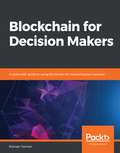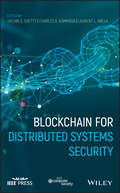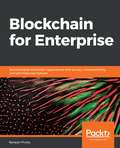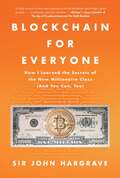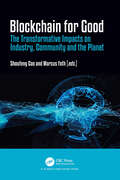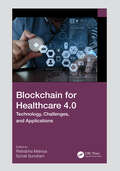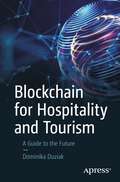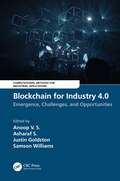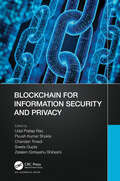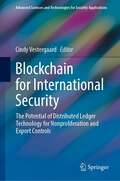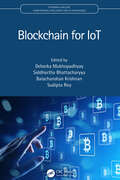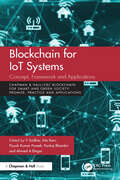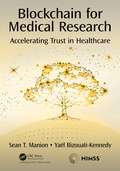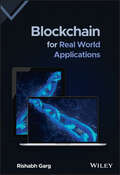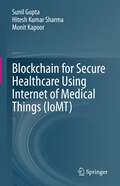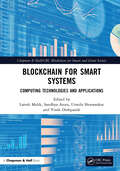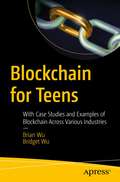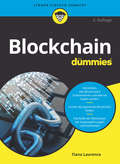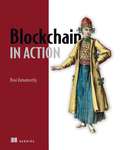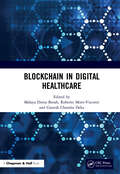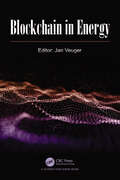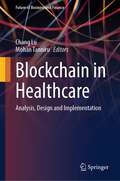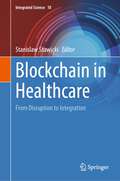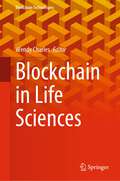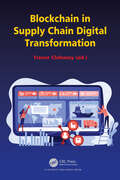- Table View
- List View
Blockchain for Decision Makers: A systematic guide to using blockchain for improving your business
by Romain TormenUnderstand how blockchain works and explore a variety of strategies to implement it in your organization effectively Key Features Become familiar with business challenges faced by companies when using blockchain Discover how companies implement blockchain to monetize and secure their data Study real-world examples to understand blockchain and its use in organizations Book Description In addition to cryptocurrencies, blockchain-based apps are being developed in different industries such as banking, supply chain, and healthcare to achieve digital transformation and enhance user experience. Blockchain is not only about Bitcoin or cryptocurrencies, but also about different technologies such as peer-to-peer networks, consensus mechanisms, and cryptography. These technologies together help sustain trustless environments in which digital value can be transferred between individuals without intermediaries. This book will help you understand the basics of blockchain such as consensus protocols, decentralized applications, and tokenization. You'll focus on how blockchain is used today in different industries and the technological challenges faced while implementing a blockchain strategy. The book also enables you, as a decision maker, to understand blockchain from a technical perspective and evaluate its applicability in your business. Finally, you'll get to grips with blockchain frameworks such as Hyperledger and Quorum and their usability. By the end of this book, you'll have learned about the current use cases of blockchain and be able to implement a blockchain strategy on your own. What you will learn Become well-versed with how blockchain works Understand the difference between blockchain and Bitcoin Learn how blockchain is being used in different industry verticals such as finance and retail Delve into the technological and organizational challenges of implementing blockchain Explore the possibilities that blockchain can unlock for decision makers Choose a blockchain framework best suited for your projects from options such as Ethereum and Hyperledger Fabric Who this book is for This book is for CXOs, business professionals, organization leaders, decision makers, technology enthusiasts, and managers who wish to understand how blockchain is implemented in different organizations, its impact, and how it can be customized according to business needs. Prior experience with blockchain is not required.
Blockchain for Distributed Systems Security
by Charles A. Kamhoua Sachin S. Shetty Laurent L. NjillaAN ESSENTIAL GUIDE TO USING BLOCKCHAIN TO PROVIDE FLEXIBILITY, COST-SAVINGS, AND SECURITY TO DATA MANAGEMENT, DATA ANALYSIS, AND INFORMATION SHARING Blockchain for Distributed Systems Security contains a description of the properties that underpin the formal foundations of Blockchain technologies and explores the practical issues for deployment in cloud and Internet of Things (IoT) platforms. The authors—noted experts in the field—present security and privacy issues that must be addressed for Blockchain technologies to be adopted for civilian and military domains. The book covers a range of topics including data provenance in cloud storage, secure IoT models, auditing architecture, and empirical validation of permissioned Blockchain platforms. The book's security and privacy analysis helps with an understanding of the basics of Blockchain and it explores the quantifying impact of the new attack surfaces introduced by Blockchain technologies and platforms. In addition, the book contains relevant and current updates on the topic. This important resource: Provides an overview of Blockchain-based secure data management and storage for cloud and IoT Covers cutting-edge research findings on topics including invariant-based supply chain protection, information sharing framework, and trust worthy information federation Addresses security and privacy concerns in Blockchain in key areas, such as preventing digital currency miners from launching attacks against mining pools, empirical analysis of the attack surface of Blockchain, and more Written for researchers and experts in computer science and engineering, Blockchain for Distributed Systems Security contains the most recent information and academic research to provide an understanding of the application of Blockchain technology.
Blockchain for Enterprise: Build scalable blockchain applications with privacy, interoperability, and permissioned features
by Narayan PrustyImplement blockchain principles in your choice of domain using Ethereum Key FeaturesBuild permissioned enterprise-grade blockchain applications from scratchImplement Blockchain-as-a-Service to enterprises in terms of deployment and securityAchieve privacy in blockchains using proxy re-encryption algorithmsBook DescriptionThe increasing growth in blockchain use is enormous, and it is changing the way business is done. Many leading organizations are already exploring the potential of blockchain. With this book, you will learn to build end-to-end enterprise-level decentralized applications and scale them across your organization to meet your company's needs. This book will help you understand what DApps are and how the blockchain ecosystem works, via real-world examples. This extensive end-to-end book covers every blockchain aspect for business and for developers. You will master process flows and incorporate them into your own enterprise. You will learn how to use J.P. Morgan’s Quorum to build blockchain-based applications. You will also learn how to write applications that can help communicate enterprise blockchain solutions. You will learn how to write smart contracts that run without censorship and third-party interference.Once you've grasped what a blockchain is and have learned about Quorum, you will jump into building real-world practical blockchain applications for sectors such as payment and money transfer, healthcare, cloud computing, supply chain management, and much more.What you will learnLearn how to set up Raft/IBFT Quorum networksImplement Quorum's privacy and security featuresWrite, compile, and deploy smart contractsLearn to interact with Quorum using the web3.js JavaScript libraryLearn how to execute atomic swaps between different networksBuild a secured Blockchain-as-a-Service for efficient business processesAchieve data privacy in blockchains using proxy re-encryptionWho this book is forThis book is for innovators, digital transformers, and blockchain developers who want to build end-to-end, decentralized applications using the blockchain technology. If you want to scale your existing blockchain system across the enterprise, you will find this book useful, too. It adopts a practical approach to solving real problems in enterprises using a blend of theory and practice.
Blockchain for Everyone: How I Learned the Secrets of the New Millionaire Class (And You Can, Too)
by Sir John HargraveFrom the author of Mind Hacking and founder of Bitcoin Market Journal comes the first book to explain the money-making secrets behind bitcoin and blockchain in a user-friendly format. When John Hargrave first invested in cryptocurrency, the price of a single bitcoin was about $125; a few years later, that same bitcoin was worth $20,000. He wasn’t alone: this flood of new money is like the early days of the Internet, creating a new breed of “blockchain billionaires.” Sir John has unlocked their secrets. In Blockchain for Everyone, Sir John reveals the formula for investing in bitcoin and blockchain, using real-life stories, easy-to-understand examples, and a healthy helping of humor. Packed with illustrations, Blockchain for Everyone explains how (and when) to buy bitcoin, cryptocurrencies, and other blockchain assets, with step-by-step instructions. Blockchain for Everyone is the first blockchain investing book written for the layperson: a guide that helps everyone understand how to build wealth wisely. It’s the new investing manifesto!
Blockchain for Good: The Transformative Impacts on Industry, Community and the Planet
by Marcus Foth Shoufeng CaoBlockchain, a technology originally developed for cryptocurrency, has evolved into a versatile tool capable of driving significant change across industries and communities. Its decentralised, secure, and transparent nature has proven valuable in applications that transcend finance, impacting supply chains, digital governance, and sustainability practices. By enabling greater trust and accountability, blockchain technology can foster ethical solutions to global challenges, promoting transparency, inclusivity, and efficiency within sectors like agriculture, healthcare, and environmental management. This book explores blockchain’s role as a catalyst for meaningful change and its potential to contribute positively to our digital future.Structured into three parts—Industry, Community, and Planet—this book examines blockchain’s role in advancing (i) sustainable business practices, (ii) supporting fairer social systems, and (iii) addressing environmental goals. Each section presents diverse case studies and theoretical insights, showing how blockchain can be applied responsibly and ethically. From enhancing transparency in fashion supply chains to supporting smallholder farmers, and from reshaping public governance to promoting the circular economy, the book offers a thorough understanding of blockchain’s transformative capabilities. It highlights interdisciplinary research and applied projects across the globe that exemplify blockchain’s capacity to serve societal and environmental purposes.Ideal for researchers, policymakers, and industry professionals, this book provides practical insights into blockchain’s potential beyond the hype. Whether you are in technology, social sciences, or environmental studies, Blockchain for Good serves as an essential resource for anyone interested in exploring how blockchain can contribute to a more equitable and sustainable world.
Blockchain for Healthcare 4.0: Technology, Challenges, and Applications
by Rishabha Malviya Sonali SundramBlockchain is a type of distributed ledger technology that consists of a growing list of records that are securely linked together using cryptography and numerous applications in every field, including healthcare. Blockchain for Healthcare 4.0: Technology, Challenges, and Applications presents an overview of the recent advances in blockchain technology which have led to new breakthroughs in the healthcare industry, the application of artificial intelligence (AI) with blockchain, challenges, and prospects. Key Features: • Highlights blockchain applications in the biomedical and pharmaceutical industries and remote healthcare. • Discusses applications and advancement in blockchain framework to track diseases and outbreaks. • Elaborates the role of blockchain in managing health records, tracing, and securing medical supplies. • Focuses on efficient and secure medical data sharing through blockchain and secure cloud-based electronic health record (EHR), a system using an attribute-based cryptosystem. • Presents techniques and methods to utilize blockchain technology for clinical studies and facilitates the transition to patient-driven interoperability. The text is primarily written for graduate students and academic researchers in the fields of computer science and engineering, biomedical engineering, electrical engineering, and information technology.
Blockchain for Hospitality and Tourism: A Guide to the Future
by Dominika DuziakLearn blockchain in a simple, non-tech way and explore the different emerging technologies that open a world of opportunities in the space of tourism and hospitality. This book showcases examples of blockchain-based solutions implemented in different industries and connects them to use cases in hospitality and tourism (disintermediation, payments, loyalty programs, supply chain management, identity management etc.). Blockchain is one of the disruptive technologies that lays foundations for Web3.0, NFTs, Metaverse and other innovations. Despite many benefits, its adoption in the hospitality industry is very slow. Lack of awareness and connection to clear return-on-investment, coupled with many misconceptions and general perception of complexity is one of the main reasons why hospitality managers are reluctant to embark on the blockchain train.Blockchain for Hospitality and Tourism serves as a practical guide to the world of innovations, from the basics of blockchain to “how to start a project” with brief explanations of different technologies and capabilities. You'll review NFTs and Metaverse, along with current developments, tools, and platforms. After reading this book, you'll be equipped with enough knowledge to make strategic business decisions and able to discuss these topics within your organization and with vendors and suppliers in a comfortable way. As blockchain enters the next phase of its evolution, with more user-friendly interfaces and interoperability, see how it opens a world of opportunities in the space of tourism and hospitality. What You'll LearnBlockchain-based innovations – cryptocurrencies and digital asset management, NFTs, Web3.0, Metaverse)Review applications of blockchain in selected industries Start a blockchain project Who This Book is ForHospitality professionals, including hotel managers and general managers, revenue management directors, operations directors, hotel IT managers, asset managers, brand strategy managers, marketing managers. Hospitality students will benefit as well. ·
Blockchain for Industry 4.0: Blockchain for Industry 4.0: Emergence, Challenges, and Opportunities (Computational Methods for Industrial Applications)
by Anoop V. S.This reference text provides the theoretical foundations, the emergence, and the application areas of Blockchain in an easy-to-understand manner that would be highly helpful for the researchers, academicians, and industry professionals to understand the disruptive potentials of Blockchain. It explains Blockchain concepts related to Industry 4.0, Smart Healthcare, and the Internet of Things (IoT) and explores Smart Contracts and Consensus algorithms. This book will serve as an ideal reference text for graduate students and academic researchers in electrical engineering, electronics and communication engineering, computer engineering, and information technology. This book • Discusses applications of blockchain technology in diverse sectors such as industry 4.0, education, finance, and supply chain. • Provides theoretical concepts, applications, and research advancements in the field of blockchain. • Covers industry 4.0 digitization platform and blockchain for data management in industry 4.0 in a comprehensive manner. • Emphasizes analysis and design of consensus algorithms, fault tolerance, and strategy to choose the correct consensus algorithm.• Introduces security issues in the industrial internet of things, internet of things, blockchain integration, and blockchain-based applications. The text presents in-depth coverage of theoretical concepts, applications and advances in the field of blockchain technology. This book will be an ideal reference for graduate students and academic researchers in diverse engineering fields such as electrical, electronics and communication, computer, and information technology.
Blockchain for Information Security and Privacy
by Piyush Kumar Shukla Udai Pratap Rao Chandan Trivedi Sweta Gupta Zelalem Sintayehu ShibeshiDistributed and peer-to-peer (P2P) applications are increasing daily, and cyberattacks are constantly adopting new mechanisms to threaten the security and privacy of users in these Internet of Things (IoT) environments. Blockchain, a decentralized cryptographic-based technology, is a promising element for IoT security in manufacturing, finance, healthcare, supply chain, identity management, e-governance, defence, education, banking, and trading. Blockchain has the potential to secure IoT through repetition, changeless capacity, and encryption. Blockchain for Information Security and Privacy provides essential knowledge of blockchain usage in the mainstream areas of security, trust, and privacy in decentralized domains. This book is a source of technical information regarding blockchain-oriented software and applications. It provides tools to researchers and developers in both computing and software engineering to develop solutions and automated systems that can promote security, trust, and privacy in cyberspace. FEATURES Applying blockchain-based secured data management in confidential cyberdefense applications Securing online voting systems using blockchain Safeguarding electronic healthcare record (EHR) management using blockchain Impacting security and privacy in digital identity management Using blockchain-based security and privacy for smart contracts By providing an overview of blockchain technology application domains in IoT (e.g., vehicle web, power web, cloud internet, and edge computing), this book features side-by-side comparisons of modern methods toward secure and privacy-preserving blockchain technology. It also examines safety objectives, efficiency, limitations, computational complexity, and communication overhead of various applications using blockchain. This book also addresses the combination of blockchain and industrial IoT. It explores novel various-levels of information sharing systems.
Blockchain for International Security: The Potential of Distributed Ledger Technology for Nonproliferation and Export Controls (Advanced Sciences and Technologies for Security Applications)
by Cindy VestergaardThis book intersects the distributed ledger technology (DLT) community with the international security community. Given the increasing application of blockchain technology in the fields of business and international development, there is a growing body of study on other use cases. For instance, can blockchain have a significant role in preserving and improving international security? This book explores this question in the context of preventing the proliferation of some of the most dangerous materials in the world—items that if not secured can lend to the development of weapons of mass destruction. It considers how blockchain can increase efficiencies in the global trade of nuclear and chemical materials and technology, thereby increasing assurances related to compliance with international nonproliferation and disarmament treaties.
Blockchain for IoT (Chapman & Hall/CRC Computational Intelligence and Its Applications)
by Siddhartha Bhattacharyya Sudipta Roy Balachandran Krishnan Debarka MukhopadhyayBlockchain for IoT provides the basic concepts of Blockchain technology and its applications to varied domains catering to socio-technical fields. It also introduces intelligent Blockchain platforms by way of infusing elements of computational intelligence into Blockchain technology. With the help of an interdisciplinary approach, it includes insights into real-life IoT applications to enable the readers to assimilate the concepts with ease. This book provides a balanced approach between theoretical understanding and practical applications. Features: • A self-contained approach to integrating the principles of Blockchain with elements of computational intelligence. • A rich and novel foundation of Blockchain technology with reference to the internet of things conjoined with the tenets of artificial intelligence in yielding intelligent Blockchain platforms. • Elucidates essential background, concepts, definitions, and theories thereby putting forward a complete treatment on the subject. • Information presented in an accessible way for research students of computer science and information technology, as well as software professionals who can inherit the much-needed developmental ideas to boost up their computing knowledge on distributed platforms. This book is aimed primarily at undergraduates, postgraduates, and researchers studying Blockchain.
Blockchain for IoT Systems: Concept, Framework and Applications (Chapman & Hall/CRC Blockchain for Smart and Green Society)
by V. Sridhar Ahmed A. Elngar Pankaj Bhambri Sita Rani Piyush Kumar PareekBlockchain and distributed-ledger technologies enable new modes of communication, synchronization, and transfer of value with a broad impact on Internet of Things (IoT), Data Science, society, industry, commerce, and government. This book studies the potential impact of blockchain and distributed-ledger technologies on IoT. It highlights the application of possible solutions in the domain of blockchain and IoT system security, including cryptology, distributed systems, law, formal methods, code verification and validation, software, and systems metrics. As the field is growing fast, the book adapts to the changing research landscape, integrates and cross-links studies and citations in related subfields, and provides an overview of these fields and how they complement each other.• Highlights how the security aspect of the integration of blockchain with IoT will help to design secure data solutions for various domains• Offers fundamental knowledge of the blockchain concept and its usage in real-life applications• Presents current and future trends on the IoT and blockchain with an efficient, scalable, and sustainable approach• Reviews future developments in blockchain and IoT in future job opportunities• Discusses how blockchain for IoT systems can help a varied range of end-users to access computational and storage resourcesThis book is intended for postgraduate students and researchers in the departments of computer science, working in the areas of IoT, blockchain, deep learning, machine learning, image processing, and big data.
Blockchain for Medical Research: Accelerating Trust in Healthcare
by Sean T. Manion Yaël Bizouati-KennedyIt takes 17 years on average to bring new medical treatments ideas into evidence-based clinical practice. The growing replicability crisis in science further delays these "new miracles." Blockchain can improve science and accelerate medical research while bringing a new layer of trust to healthcare. This book is about science, its value to medicine, and how we can use blockchain to improve the quality and impact of both. The book looks at science and medicine from an insider’s perspective and describes the processes, successes, shortcomings and opportunities in an accessible way for a broad audience. It weaves this a non-technical look at the emerging world of blockchain technology; what it is, where it is useful, and how it can improve science and medicine. It lays out a roadmap for this application to transform how we develop knowledge about health and medicine to improve our lives. In the first part, Blockchain isn’t Tech, the authors look at blockchain/distributed ledger technology along with critical trade-offs and current explorations of its utility. They give an overview of use cases for the technology across industries, including finance, manufacturing and healthcare, with interviews and insights from leaders across government, academia, and tech/health industry both big and start-up. In the second part, Science is Easy, the authors look at science as a process and how this drives advancement in medicine. They shed a light on some of science’s shortcomings, including the reproducibility crisis and problems with misaligned incentives (i.e. publish or perish). They apply a breakdown of critical components to the functional steps in the scientific process and outline how the open science movement is looking to improve these, while highlighting the limit of these fixes with current technology, incentives and structure of science. In the third part, DAO of Science, the authors look at how blockchain applied to open science can impact medical research. They examine how this distributed approach can provide better quality science, value-based research and faster medical miracles. Finally, they provide a vision of the future of distributed medical research and give a roadmap of steps to get there.
Blockchain for Real World Applications
by Rishabh GargBlockchain for Real World Applications A comprehensive examination of blockchain architecture and its key characteristics Blockchain architecture is a way of recording data such that it cannot be altered or falsified. Data is recorded in a kind of digital ledger called a blockchain, copies of which are distributed and stored across a network of participating computer systems. With the advent of cryptocurrencies and NFTs, which are entirely predicated on blockchain technology, and the integration of blockchain architecture into online and high-security networked spaces more broadly, there has never been a greater need for software, network, and financial professionals to be familiar with this technology. Blockchain for Real World Applications provides a practical discussion of this subject and the key characteristics of blockchain architecture. It describes how blockchain technology gains its essential irreversibility and persistency and discusses how this technology can be applied to the information and security needs of different kinds of businesses. It offers a comprehensive overview of the ever-growing blockchain ecosystem and its burgeoning role in a connected world. Blockchain for Real World Applications readers will also find: Treatment of real-world applications such as ID management, encryption, network security, and more Discussion of the UID (Unique Identifier) and its benefits and drawbacks Detailed analysis of privacy issues such as unauthorized access and their possible blockchain-based solutions Blockchain for Real World Applications is a must for professionals in high-security industries, as well as for researchers in blockchain technologies and related areas.
Blockchain for Secure Healthcare Using Internet of Medical Things (IoMT)
by Sunil Gupta Hitesh Kumar Sharma Monit KapoorHealthcare has become an extremely important and relevant topic in day to day discussions ever since the COVID-19 pandemic has been encountered by the global population. This has led to a renewed focus and attention that researchers from every discipline have put in to realize better strategies for healthcare management in general. This book is an attempt to put to use recent advancements in the field of the Internet of Medical Things often called IoMT, which is an extension of IoT for real-time, data analytics-driven prompt and quality healthcare to global citizens. Security has been always a challenge with pervasive technologies like IoMT and IoT, and thus usage of disruptive technology like blockchain to offset the security concerns that surround the data and network management. Therefore, this book is an honest attempt to provide directions to applied areas of research in IoMT for healthcare with the aid and help of Blockchain Technologies.
Blockchain for Smart Systems: Computing Technologies and Applications (Chapman & Hall/CRC Blockchain for Smart and Green Society)
by Latesh Malik Sandhya Arora Urmila Shrawankar Vivek DeshpandeBlockchain technology has been penetrating every aspect of Information and Communications Technology (ICT), and its use has been growing rapidly in recent years. The interest and development of this technology has primarily been driven by the enormous value growth of cryptocurrencies and large investments of venture capital in blockchain start-ups. Blockchain for Smart Systems: Computing Technologies and Applications is intended to clarify and define, in simple terms, the technology behind blockchain. It provides a deep dive into the core fundamentals of blockchain: hashing algorithm behind each block, distributed technology, smart contracts, and private vs. public blockchain. Features Discusses fundamental theories of practical and sophisticated applications of blockchain technology Includes case studies Discusses the concepts with illustrations, appropriate figures, tables, and simple language This book is primarily aimed at undergraduates, graduates, research scholars, academicians, and industry and technology enthusiasts working in various aspects of blockchain technology.
Blockchain for Teens: With Case Studies and Examples of Blockchain Across Various Industries
by Brian Wu Bridget WuSimilar to the Internet in the 1990s, Blockchain promises to revolutionize the world by reforming current business models. This book is a beginner-friendly guide for teens looking to build a basic foundation in Blockchain technologies. You'll start with an introduction to Blockchain, learn about the main features, and understand decentralization. Additionally, you'll get to know the current monetary system, major concepts in cryptography, and an overview of cryptocurrency. The book then explores various topics in Bitcoin, including its history, the consensus mechanism and the mining process. You'll also be introduced to non-fungible tokens (NFT)s, one of Blockchain’s most well-known technologies, and delve into its different aspects, including the top NFT marketplaces. There is also a chapter about the Metaverse, another groundbreaking technology that will influence society throughout the next decade. You'll see how Crypto and NFTs enhance the Metaverse, and the relationship between Blockchain and the Metaverse. At the end of the book you'll review topics from previous chapters in a discussion on the future of Blockchain and conclude with an overview of real-life examples of Blockchain across various industries. What You'll Learn Examine the basics of Bitcoin and EthereumCreate your very own Bitcoin walletUnderstand the concept of NFTs and build your first tokenExplore the Metaverse in Blockchain Envision the future of Blockchain This Book Is For Teens who are looking to build a basic understanding of Blockchain technologies.
Blockchain für Dummies (Für Dummies)
by Tiana LaurenceDie Blockchain-Technologie verspricht, den Finanzmarkt, die Versicherungsbranche, das Supply-Chain-Management und andere Branchen zu revolutionieren. Aber Sie müssen kein Tech-Nerd sein, um die Blockchain zu verstehen. Dieses Buch erklärt die Grundlagen und wichtige Anwendungen wie Kryptowährungen und Smart Contracts. Reale Beispiele machen deutlich, wie Blockchains funktionieren und wo ihr Mehrwert liegt. Erstellen Sie eine eigene Blockchain, schauen Sie sich die wichtigsten Blockchain-Anbieter an, erkennen Sie das Disruptionspotenzial für eingesessene Industrien und vieles mehr.
Blockchain in Action (In Action Ser.)
by Bina RamamurthyThere&’s a lot more to the blockchain than mining Bitcoin. This secure system for registering and verifying ownership and identity is perfect for supply chain logistics, health records, and other sensitive data management tasks. Blockchain in Action unlocks the full potential of this revolutionary technology, showing you how to build your own decentralized apps for secure applications including digital democracy, private auctions, and electronic record management.Summary There&’s a lot more to the blockchain than mining Bitcoin. This secure system for registering and verifying ownership and identity is perfect for supply chain logistics, health records, and other sensitive data management tasks. Blockchain in Action unlocks the full potential of this revolutionary technology, showing you how to build your own decentralized apps for secure applications including digital democracy, private auctions, and electronic record management. Purchase of the print book includes a free eBook in PDF, Kindle, and ePub formats from Manning Publications. About the technology Blockchain is more than just the tech behind Bitcoin—much more! Combining impenetrable security, decentralized transactions, and independently verifiable supply chains, blockchain applications have transformed currency, digital identity, and logistics. Platforms such as Ethereum and Hyperledger make it easy to get started by using familiar programming languages. About the book Blockchain in Action teaches you how to design and build blockchain-based decentralized apps, and is written in a clear, jargon-free style. First, you&’ll get an overview of how blockchain works. Next, you&’ll code your first smart contract using Ethereum and Solidity, adding a web interface, trust validation, and other features until your app is ready for deployment. The only thing you need to get started is standard hardware and open source software. What's inside Blockchain compared with other distributed systems Development in Solidity Identity, privacy, and security On-chain and off-chain data and operations About the reader For programmers who know JavaScript. About the author Bina Ramamurthy has thirty years of experience teaching distributed systems, data science, peer-to-peer networking, and blockchain. Table of Contents PART 1 - GETTING STARTED WITH BLOCKCHAIN PROGRAMMING 1 Blockchain basics 2 Smart contracts 3 Techniques for trust and integrity 4 From smart contracts to Dapps PART 2 - TECHNIQUES FOR END-TO-END DAPP DEVELOPMENT 5 Security and privacy 6 On-chain and off-chain data 7 Web3 and a channel Dapp 8 Going public with Infura PART 3 - A ROADMAP AND THE ROAD AHEAD 9 Tokenization of assets 10 Testing smart contracts 11 A roadmap to Dapp development 12 Blockchain: The Road ahead
Blockchain in Digital Healthcare
by Malaya Dutta Borah, Roberto Moro-Visconti and Ganesh Chandra DekaBlockchain is a series of transactions recorded in blocks and secured cryptographically. It is immutable, decentralized, and transparent and has proved to be beneficial across all domains to protect and store data. Maintaining privacy, integrity, and security, blockchain is particularly valuable to the healthcare industry. of healthcare data. Blockchain in Digital Healthcare provides a panoramic review of prospects of blockchain technology in the healthcare domain. Users can record transactions in blocks in an immutable distributed ledger that cannot be changed once recorded and/or published. Blockchain is also decentralized, which eliminates dependency on a trusted third party to facilitate transactions, enabling clients and other users of the blockchain to take ownership of the data they push on the network. Blockchain also makes transactions more secure as clients have their own copies. Features: Provides systematic and comprehensive understanding of the block chain technology and the potential in healthcare Describes how security and privacy concerns of healthcare data can be addressed using Blockchain Technology Discusses the concept of smart contracts for performing advanced level scripting to create a blockchain network to provide a platform for the development of decentralized applications Includes a chapter on role of blockchain based insurance application using Ethereum/Hyperledger Presents cases of blockchain use for various aspects of drug manufacturing and the pharma supply chain This book serves as a reference book for IT professionals, scientific investigators and researchers who need to analyze the prospects of blockchain technology in healthcare.
Blockchain in Energy
by Jan VeugerThe global energy crisis is accelerating, and within Europe, the European Union (EU) is actively working to address this challenge through policy frameworks and political management. However, the energy market remains fiercely competitive, prompting us to explore alternative energy sources and rethink how we generate, distribute, and utilize power. This, in turn, raises questions about the allocation of power, energy availability, and usage in various contexts.Furthermore, the digital realm is undergoing rapid transformation across multiple sectors. Drawing on my expertise in blockchain technology, I recognize numerous opportunities to enhance the transparency and reliability of data related to energy issues. By leveraging blockchain, we can ensure that the information available is trustworthy and insightful for every user.The aim of this book is to share my knowledge in the realm of energy and blockchain. It addresses the urgency of addressing global energy challenges and acknowledges the pivotal role of the EU in this endeavor. It also highlights the intensity of competition in the energy market and the need for innovative approaches. The book also demonstrates how blockchain can contribute to solving these issues, empowering individuals and organizations with reliable information and insights in the field of energy and blockchain technology.
Blockchain in Healthcare: Analysis, Design and Implementation (Future of Business and Finance)
by Chang Lu Mohan TanniruThis books brings readers a holistic understanding of blockchain adoption in healthcare by not only considering the technical fundamentals of use cases, but also the regulatory, informational and organizational challenges and solutions. The book also provides frameworks and toolkits to manage the entire life cycle of adoption, including analysing the environment and feasibility, application design from a user-centred perspective, and implementation strategies that would overcome organizational and informational barriers. Specific issues addressed include but are not limited to: How to analyse the value propositions in healthcare and which distributed actors should be engaged to fulfil these propositions? What policies and practices need to be reviewed to ensure security and privacy of the information shared? How to design blockchain systems that seamlessly integrate with other stakeholder applications, while only the needed information is in the distributed architecture? How can blockchain implementation be managed from governance and risk mitigation perspectives, especially when multiple actors are involved?By reading this book, blockchain enthusiasts, health informatics professionals and healthcare executives will be better prepared to leverage the transformative potential of blockchain for healthcare.
Blockchain in Healthcare: From Disruption to Integration (Integrated Science #10)
by Stanislaw StawickiBlockchain technology (BT) is quietly transforming the world, from financial infrastructure, to the internet-of-things, to healthcare applications. With increasing penetration of BT into various areas of our daily lives, the need arises for better awareness and greater knowledge about the capabilities, benefits, risks, and alternatives to distributed ledger applications. It is hoped that current book will be one of the pioneering collections focusing on blockchain implementations in the area of healthcare, with specific aim to present content in an easy-to-understand and readily accessible way for typical end-users of blockchain-based applications. There are important areas within the fabric of modern healthcare that stand to benefit from implementations of BT. These areas include electronic medical records, quality control, patient safety, finance, device tracking, biostamping/biocertification, redundant storage of critical data, health and liability insurance, medication utilization tracking (including opioid and antibiotic misuse), financial transactions, academics/education, asset tokenization, public health and pandemics, healthcare provider credentialing, and many other potential applications. The ultimate goal of the proposed book would be to provide an integrative, easy-to-understand, and comprehensive picture of the current state of blockchain use in healthcare while actively engaging the reader in a forward-looking, exploratory approach toward future developments in this space. To accomplish this goal, an expert panel of contributors has been assembled, featuring scholars from top global universities and think-tanks.
Blockchain in Life Sciences (Blockchain Technologies)
by Wendy CharlesThis book highlights the latest advances on the implementation and adaptation of blockchain technologies in real-world scientific, biomedical, and data applications. It presents rapid advancements in life sciences research and development by applying the unique capabilities inherent in distributed ledger technologies. The book unveils the current uses of blockchain in drug discovery, drug and device tracking, real-world data collection, and increased patient engagement used to unlock opportunities to advance life sciences research. This paradigm shift is explored from the perspectives of pharmaceutical professionals, biotechnology start-ups, regulatory agencies, ethical review boards, and blockchain developers. This book enlightens readers about the opportunities to empower and enable data in life sciences.
Blockchain in Supply Chain Digital Transformation
by Trevor ClohessyBlockchain and distributed ledger technology (DLT) have been identified as emerging technologies that can enhance global supply chain management processes. Given the embryonic nature of the technology, use cases pertaining to how it can be adopted and deployed in supply chain contexts are scarce. This book shares blockchain supply chain use cases across a range of industries including smart cities, food imports, product traceability, decentralised finance, procurement, energy management, consensus mechanism security, and industry 4.0. Given its scope, it is primarily intended for academics, students, researchers, and practitioners who want to learn more about how blockchain can digitally transform global supply chains.
